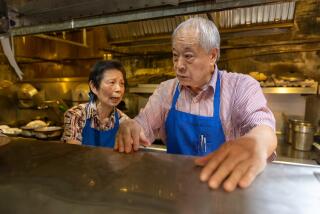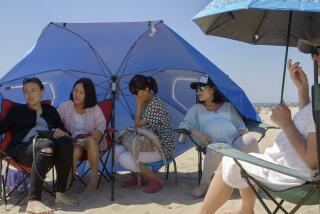‘Paper sons,’ hidden pasts
- Share via
A few years ago, I corresponded with a young Chinese American man who complained that his grandparents didn’t treat his father and him like the rest of the family. I asked if his father might have been a “paper son” -- someone who had come to this country from China using papers claiming false U.S. citizenship and often false blood ties. My correspondent had never heard the term, but he asked his father, and it turned out I was right. I met the young man a few days later, and he was devastated. All the people he thought were his relatives -- his grandparents, aunts and uncles, and all of his cousins -- were not related to him at all, and they had kept it from him his entire life.
All people have secrets, but immigrants have more secrets than most. What were they fleeing from in their home countries? How did they get here? What did they do to establish citizenship? The process of becoming an American citizen is often just as rife with embarrassment, shame and survivor’s guilt as it is with honor, pride and reverence.
In the Chinese American community, nothing is more of a secret or more insidious in its consequences than the tradition of paper sons, which can trace its origins to the Chinese Exclusion Act of 1882. That law barred the entry of all Chinese immigrants to the United States except for those who were diplomats, academics, ministers or merchants.
At first there was only one way to get around the law: masquerade as a merchant. My great-grandfather, for example, was a legitimate merchant, but he had many “paper partners” -- those who paid him a fee to be listed as one of his partners, hence a merchant -- in the paperwork he was required to show the government every six months.
A new opportunity for citizenship arose after the San Francisco earthquake and fire of 1906, when all birth records for the state were destroyed. Suddenly Chinese men who were already in the U.S. could claim that they’d been born here. (This was important, because until 1943 it was against the law for Chinese to become naturalized citizens. So many men claimed U.S. citizenship this way that it was said for it to be true, every Chinese woman in California pre-1906 would have needed to have given birth to 600 sons.)
This loophole was a boon, for it allowed Chinese men to return to China as U.S. citizens, report that their wives had given birth to a son there (a child born to a U.S. citizen abroad is automatically eligible to be a U.S. citizen) and receive a piece of paper creating a “paper son.” This document could then be used by a real son or sold to a friend, neighbor, relative or total stranger. The paper sons adopted their new surnames, then came to the U.S. as citizens and lived with their new families as sons and brothers. Later, they were able to bring in wives and children and sometimes even bring in paper sons themselves.
It sounds complicated because it was. It needed to be complicated. It was the very nature and depth of the complications that confused and often stumped immigration inspectors. But they also confused and bewildered families.
Most pioneer Chinese American families have relatives who aren’t related by blood. In my family, I had an uncle who wasn’t an actual uncle. I had another uncle who was related in some way but many, many times removed. I didn’t know the truth about these relationships until I was in my 30s. In other families, these things are open secrets: “I’m a Yee, but I was born a Wong.”
Even after the Exclusion Act was overturned in 1943, the legacy of paper sons continued. For my book, “Shanghai Girls,” I interviewed people about the U.S. government’s “confession program,” which began in 1957 and asked Chinese who came here as paper sons to confess and then receive legitimate citizenship. But in this amnesty program, it wasn’t enough to confess about yourself; you also had to rat out your friends, neighbors, business associates and even family members. Better yet, if you could say that you suspected so-and-so of being a communist, you’d get your citizenship for sure. This program ripped apart communities, businesses and families.
Even when the government wasn’t actively interfering, immigration secrets affected all facets of families’ daily lives: school, work, marriage, any time they had to sign a piece of paper. When my father was in elementary school, he announced to his class that his parents weren’t married. (California’s miscegenation laws lasted until 1948. His parents -- as did all my relatives who entered into mixed marriages -- married in Mexico.)
Laws are one thing, but not much on Earth comes close to the cruelty and cliquishness of elementary school mothers. My grandmother never forgot or forgave the humiliation heaped on her by the other mothers.
My half-Chinese great-uncle instilled in his daughters the following: “Never ever tell anyone you’re a quarter Chinese.” The reason: He had bought a house in Beverly Hills, and until 1948 it was against the law in California for people who were even one-quarter Chinese to own property here, just as it was against the law for him to be married to his white wife.
It was one of the many times that our non-Asian sounding family name, See, came in handy. But it didn’t do much to take away the fear my cousins felt as children that they would be found out.
The state of California last month formally apologized to thousands of Chinese immigrants who helped build the state while facing persistent racism and debilitating laws targeting them. The state’s action is part of a trend that includes Congress’ apologies for slavery and for the internment of Japanese Americans during World War II. But what do these apologies do for people living with the consequences of decades of secrets?
Some Holocaust survivors never mention what happened to them in the camps. The same holds true for many Japanese Americans who were interned. Some Chinese Americans can banter at a banquet about family secrets, while others hold on to them no matter what kind of pain they might bring to others or the solace the lifting of them might bring to themselves. Still others, like those who pushed for the state’s apology, believe that the only way to guarantee that we can never forget or repeat what happened in the past is to bring the horrors out into the open.
This last is the correct view, but I can’t help thinking of a man I interviewed a couple of years ago. He was a paper son who confessed in 1957. He told me: “We’ve never told our children or our grandchildren what happened back then. We aren’t dead yet, so we aren’t safe yet.”
Apologies are all well and good, but they do little to help the people who suffered in the past or take away more than a century of fear.
More to Read
Sign up for Essential California
The most important California stories and recommendations in your inbox every morning.
You may occasionally receive promotional content from the Los Angeles Times.













